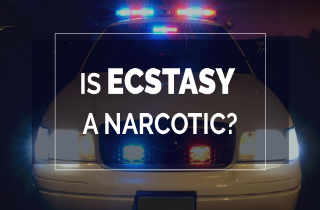Yes and no.
Ecstasy is a legal narcotic but not a medical narcotic. Ecstasy acts as both a stimulant and psychedelic, producing an energizing effect, distortions in time and perception, and enhanced enjoyment of tactile experiences. It is a Schedule I drug, meaning it has no accepted medical uses in the U.S. More on the distinction legal and medical narcotics here, with a section at the end for your questions.
What is a narcotic? (medical)
Narcotics (also called opioid pain relievers) are used only for pain that is severe and is not helped by other types of painkillers. Narcotics work by binding to receptors in the brain, which blocks the feeling of pain. When used carefully and under a doctor’s direct care, they can be effective at reducing pain. Some common medical narcotics include:
- morphine
- codeine
- hydrocodone
- oxycodone
The main ingredient in ecstasy, 3,4-methylenedioxy-methamphetamine (MDMA), is not a medical narcotic.
What is a narcotic? (legal)
The term narcotic originally referred medically to any psychoactive compound with sleep-inducing properties. But when used in a legal context, a narcotic drug is simply one that is totally prohibited, or one that is used in violation of strict governmental regulation.
When it comes to a drug that is currently listed in Schedule I, if it is undisputed that such drug has no currently accepted medical use in treatment in the United States and a lack of accepted safety for use under medical supervision, and it is further undisputed that the drug has at least some potential for abuse sufficient to warrant control under the Controlled Substance Act (CSA), the drug must remain in Schedule I. In such circumstances, placement of the drug in schedules II through V would conflict with the CSA since such drug would not meet the criterion of “a currently accepted medical use in treatment in the United States.”
Why is ecstasy a Schedule I drug?
Schedule I drugs, substances, or chemicals are defined as drugs with no currently accepted medical use and a high potential for abuse. Schedule I drugs are considered the most dangerous of psychoactive drugs, with potentially severe psychological or physical dependence. While MDMA rarely provokes severe cases of dependence on ecstasy, this ruling still means that the establishment view ecstasy as having a high potential for abuse, no currently accepted medical use in treatment in the United States, and a lack of accepted safety for use under medical supervision.
Are there medical uses for ecstasy?
The U.S. government currently classifies ecstasy as a Schedule I drug, meaning it has no accepted medical uses. But some researchers say the drug is unique in that it eases fear without sedation. “There is nothing else like this in psychiatry — a fast-acting anti-anxiety medication that makes people alert and talkative,” said Julie Holland, a psychiatrist at the New York University Medical Center. Still, to use ecstasy is often equated with direct abuse.
Is ecstasy addictive?
Research thus far on ecstasy’s addictive properties have shown varying results, but we do know that some users report symptoms of dependence, including continued use despite knowledge of physical or psychological harm, tolerance (or diminished response), and withdrawal effects. The neurotransmitter systems targeted by MDMA are the same as those targeted by other addictive drugs.
Should ecstasy classification change?
PROs
There are some suggestions that the current system of recreational drug classification was arbitrary and unscientific and that a more scientific measure of harm should be used for classifying drugs. The new classification system suggested that heroin, cocaine, alcohol, benzodiazepines, methamphetamine, and tobacco have a high or a very high risk of harm or abuse potential, whilst cannabis, LSD, and Ecstasy were all below the two legal drugs in harm or abuse potential.
CONs
Ecstasy may impair memory, some studies indicate, so researchers need to determine whether the drug’s benefits are worth the risks.
Ecstasy narcotic questions
Please share your opinion or write any question you have about ecstasy narcotic or medical use of MDMA. We will try to respond you personally and promptly.









Related Posts